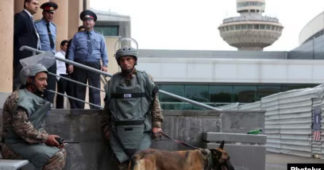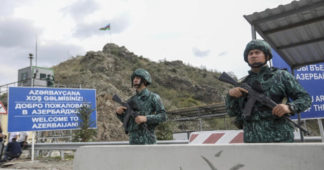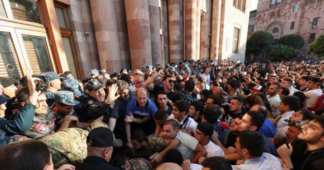May 17, 2024
Armenia and Azerbaijan said on Thursday they had agreed on a deal on disputed sections of their shared border, a new step towards normalizing ties between the historic rivals.
The deal between the two Caucasus nations, both former Soviet republics, includes the return to Azerbaijan of four border villages seized by Armenia in the 1990s.
Yerevan and Baku say they hope to reach a comprehensive peace agreement.
This follows Azerbaijan’s recapture last year of its breakaway region of Nagorno-Karabakh, which had been controlled for decades by Armenian separatists.
In late March, Armenian Prime Minister Nikol Pashinyan agreed to return four abandoned villages that Yerevan seized in the 1990s.
But locals in nearby Armenian settlements say that could cut them off from the rest of the country and accuse Pashinyan of unilaterally giving away territory without any guarantees in return.
The premier’s move has sparked weeks of anti-government protests in Armenia, with thousands of demonstrators led by charismatic cleric Bagrat Galstanyan demanding Pashinyan’s resignation.
Armenian and Azerbaijani foreign ministries said in identical statements that the two countries’ border delimitation commissions signed a protocol formalizing the “adjustment of coordinates based on the geodetic measurements on the ground” based on Soviet-era maps.
The move will see four border villages — Baghanis Ayrum, Ashaghi Askipara, Kheyrimli, and Ghizilhajili — return to Azerbaijani control.
Strategic Territory
Speaking during his cabinet meeting on Thursday, Pashinyan hailed the agreement as a “very important milestone for further strengthening Armenia’s sovereignty and independence.”
“For the first time since independence (from the Soviet Union in 1991), our republic has an officially delimited border,” he said.
“This brings our security and stability to a new level.”
The territory which Armenia agreed to retrocede is of strategic importance for the landlocked country as it controls sections of a vital highway to Georgia.
Pashinyan said Armenia would build new roads in the area over the next few months, and the two countries’ border guards would be deployed along the redrawn frontier “within the next 10 days.”
Armenia and Azerbaijan fought two wars, in the 1990s and in 2020, for control of the then-contested breakaway region of Nagorno-Karabakh.
Baku recaptured it last September in a lightning offensive, ending three decades of rule by Armenian separatists and prompting more than 100,000 locals to flee into Armenia.
We remind our readers that publication of articles on our site does not mean that we agree with what is written. Our policy is to publish anything which we consider of interest, so as to assist our readers in forming their opinions. Sometimes we even publish articles with which we totally disagree, since we believe it is important for our readers to be informed on as wide a spectrum of views as possible.











